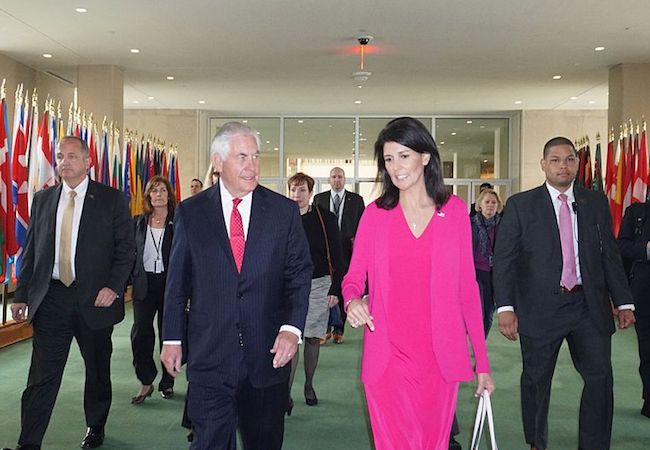Nikki Haley’s statement on Doha-Hamas ties and its possible implications for US policy toward Qatar

By Shahab Moghadam
The decision by Gulf Arab states including Saudi Arabia, Bahrain and the UAE in June 2017 to sever diplomatic and commercial ties with Qatar in response to its sponsorship of Islamist groups across the Middle East and its ties with Iran was initially considered by many Western observers to be a temporary move. However, as the half-year mark approaches, the dispute remains an ever-present reality in the Gulf, with decreasing odds of a prompt resolution as the days go by. From the beginning, the positions of regional actors regarding the Qatar-GCC crisis have been clear and backed by financial and political actions on the ground, with Turkey and Iran uniting behind Doha as many Arab and African nations united behind the GCC states. The EU, per usual, has avoided thrusting its weight into the crisis, while Russia has attempted to engage in shuttle diplomacy to avoid losing opportunities to engage constructively with either party.
The United States, on the other hand, has been remarkably inconsistent in its response to the Qatar crisis, with Secretary Rex Tillerson at various points contradicting President Donald Trump, and UN Ambassador Nikki Haley at times contradicting Secretary Rex Tillerson within the State Department itself. Secretary Tillerson, for his part, has been consistent from the beginning in his desire to assist the feuding states in resolving their dispute, engaging in an intensive yet ultimately unsuccessful shuttle diplomacy campaign between the various capitals involved. At the same time, President Trump has expressed support for the Saudi-led “Anti-Terror Quartet” and its decisions, lambasting Qatar on Twitter and in public comments for its alleged sponsorship of terror groups as well as its acceptance of Iran’s regional activities. Senior Trump administration officials have not been shy to travel to Riyadh to engage with the Kingdom’s leadership on regional political issues despite its ongoing efforts to isolate Doha, in effect tacitly accepting the status quo and leaning toward the Saudi point of view. Some have argued that the Saudi role as a US ally in an unstable region is of such significance that for the Trump administration to continue to engage with Riyadh is a routine matter unrelated to the circumstances facing the Gulf region, however, the sheer intensity of the increased cooperation between the Kingdom and Washington casts doubt on such a claim.
In light of the muddled US response to the Qatar dispute, a statement by Ambassador Haley in testimony before the House Foreign Affairs Committee on June 28th raised eyebrows in its directness and pointedness in criticizing Qatar. The UN Mission chief stated to Members of Congress on the record that Qatar was “funding Hamas”, prompting much curiosity from the committee’s members on both sides of the aisle. A leading US official stating on the record in Congressional testimony that the nation hosting the largest airbase used by American military personnel in the Middle East is financing a designated terror organization was highly unusual if not unprecedented, leading the committee’s staff to send the Ambassador written follow-up questions asking if the US Government is aware of any payments to the Gaza-based Islamist group by Doha. In her October response, Haley stated that the US is not aware of any such payments, thereby reversing her June testimony. The US Mission to the UN did not respond to repeated requests for comment on this topic.
As the dispute between Qatar and multiple of its neighbors approaches the half-year mark, the United States’ position toward the issue remains largely ambiguous despite the Secretary of State’s initial vehemence in seeking a negotiated solution. Whether Ambassador Haley’s June 28th statement on the Doha government bankrolling Hamas remains a minor misstatement or becomes incorporated into a US policy based on President Trump’s supportive statements regarding the blockade remains to be seen in the months ahead.
Shahab Moghadam has worked on political campaigns on both coasts and is a professional writer in Washington D.C. He has traveled in and written extensively on the Middle East.




